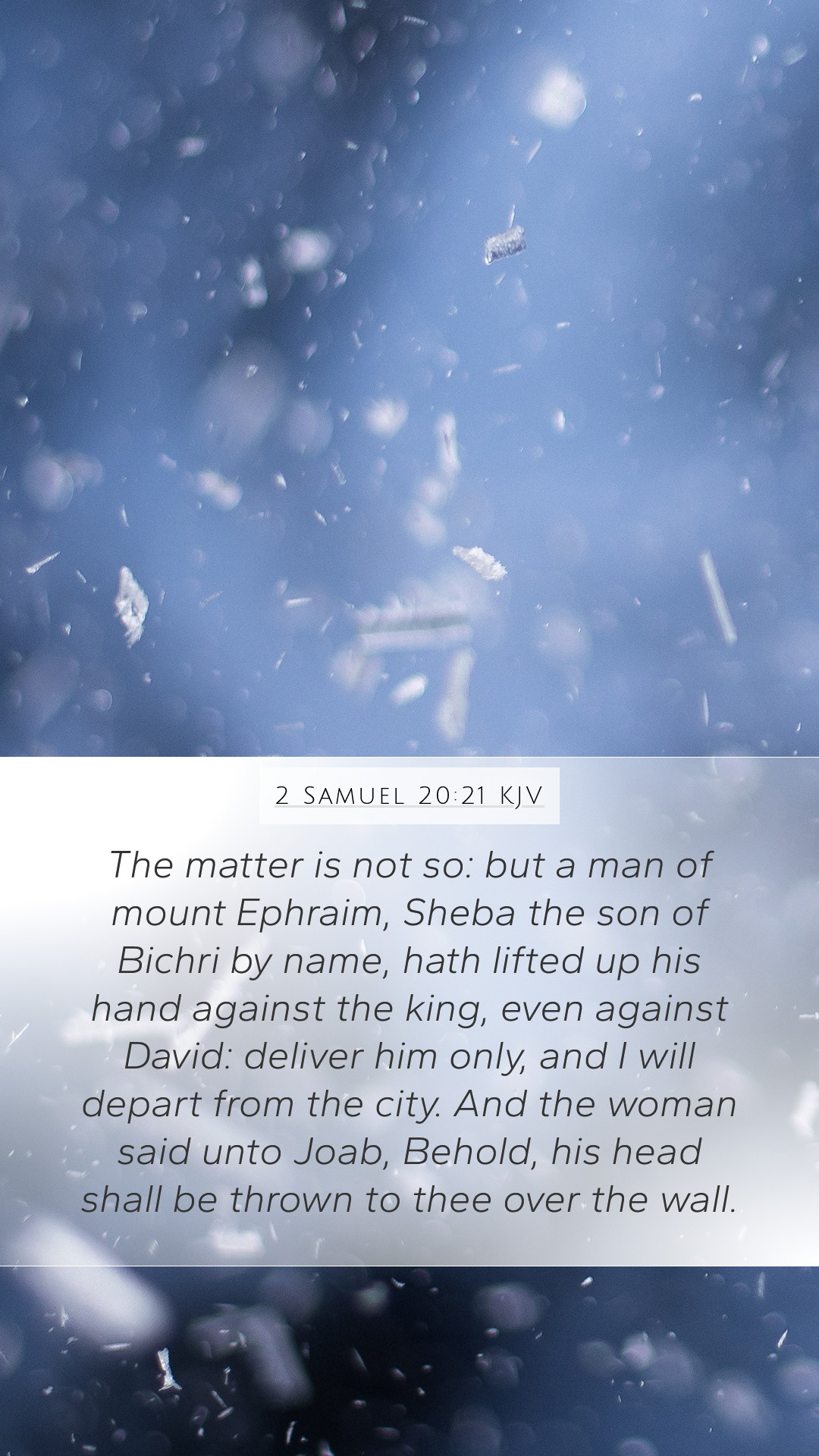Understanding 2 Samuel 20:21 - Bible Verse Explanations
Bible Verse: 2 Samuel 20:21
Text: "But a man of mount Ephraim, Sheba the son of Bichri, hath lifted up his hand against the king, even against David: deliver him only, and I will depart from the city."
The verse presents a critical moment during a tense period in King David’s reign, wherein a rebellious figure, Sheba, threatens the stability of his kingdom. To understand this passage fully, we can draw from various public domain commentaries to enrich our comprehension of its meaning and implications.
Overall Context
This verse occurs within a narrative arc in 2 Samuel that details the internal conflicts within Israel, particularly the strife that arises during and after Absalom's rebellion. The context highlights David’s struggles against insurgency and the complex relationships among the tribes of Israel.
Commentary Insights
-
Matthew Henry's Commentary:
Matthew Henry discusses the nature of rebellion and the consequences it brings upon a kingdom. He notes that Sheba’s insurrection against King David represents a deeper division within Israel, stressing the importance of unity under divine authority. Henry emphasizes that the call to deliver Sheba is a strategic move to preserve peace and avoid further bloodshed.
-
Albert Barnes’ Notes:
Albert Barnes provides a detailed analysis of the characters involved, particularly focusing on Sheba's actions and their implications for David’s kingship. He elucidates that Sheba's claim as a contentious leader signifies a challenge to David’s divine appointment as king. Barnes interprets David's response as a method to swiftly resolve the conflict while maintaining his royal dignity.
-
Adam Clarke's Commentary:
Adam Clarke sheds light on the geographic and sociopolitical nuances of Mount Ephraim and its significance within Israel. He suggests that Sheba’s heritage constitutes a pivotal aspect of his rebellion, as Ephraim was known for its historic role in Israel's leadership. Clarke interprets the verse as reflective of the fractured nature of Israelite allegiance, pointing to the need for wise and discerning leadership to navigate such divisions.
Key Themes and Concepts
1. The Nature of Rebellion: The verse encapsulates the challenge of managing dissent within a kingdom, where leaders must continually assert their authority to maintain peace.
2. Calls for Deliverance: The plea to deliver Sheba speaks to the delicate balance that David must strike between justice and mercy, illustrating leadership qualities essential for maintaining order.
3. Political Alliances: The reference to Sheba from Mount Ephraim highlights the factionalism that characterized ancient Israelite society, which continues to be relevant in discussions of governance and tribe loyalty.
Application of the Verse
In our modern context, this verse serves as a poignant reminder about the dynamics of leadership, rebellion, and the need for reconciliation within organizations and communities. It invites readers to reflect on their commitments to unity and the resolve required to address issues of discord.
Related Bible Cross References
- 1 Samuel 10:27 - The sentiment of dissent against leadership.
- 2 Samuel 15:1-12 - The rise of Absalom and the challenges faced by David.
- 1 Kings 12:16 - The division of Israel and the consequences of failed leadership.
Conclusion
In summary, 2 Samuel 20:21 offers rich opportunities for biblical study insights and serves as a case study in understanding scripture amidst conflict. By applying the teachings from various commentaries, readers can grasp the complexities involved in the biblical narrative and derive meaningful applications for contemporary life.
Engaging with this verse through various Bible study resources, Bible study guides, and online Bible study platforms will deepen your understanding and enhance your biblical exegesis of significant scripture passages.


